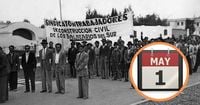As Colombia gears up for 2025, the country's vibrant calendar of holidays offers numerous opportunities for citizens to enjoy time off, travel, or engage in family activities. The holidays, regulated by Law 51 of 1983, also known as the Emiliani Law, are a hallmark of Colombian culture, providing a blend of civil and religious celebrations.
Colombia is renowned for having one of the most extensive holiday calendars in South America. For 2025, the official list of holidays includes:
- Wednesday, January 1: New Year's Day
- Monday, January 6: Epiphany
- Monday, March 24: Saint Joseph's Day (moved from March 19)
- Thursday, April 17: Holy Thursday
- Friday, April 18: Good Friday
- Sunday, April 20: Easter Sunday (always a holiday, but on a Sunday)
- Thursday, May 1: Labor Day
- Monday, June 2: Ascension Day (moved from May 30, 40 days after Easter)
- Monday, June 23: Corpus Christi (moved from June 19)
- Monday, June 30: Sacred Heart Day (moved from June 27)
- Monday, June 30: Saint Peter and Saint Paul (moved from June 29)
- Sunday, July 20: Colombian Independence Day
- Thursday, August 7: Battle of Boyacá
- Monday, August 18: Assumption of the Virgin (moved from August 15)
- Monday, October 13: Day of the Race (moved from October 12)
- Monday, November 3: All Saints' Day (moved from November 1)
- Monday, November 17: Independence of Cartagena (moved from November 11)
- Monday, December 8: Immaculate Conception Day
- Thursday, December 25: Christmas
These holidays not only allow for rest but also serve as a time for Colombians to commemorate significant cultural and religious events. For instance, the Festival de la Leyenda Vallenata, typically held in April, celebrates the rich musical heritage of the vallenato genre. Meanwhile, the Feria de las Flores in Medellín, scheduled for August, showcases the region's floral beauty and cultural diversity.
In addition to these festivities, the article highlights the essential legal framework surrounding holidays in Colombia. According to the Substantive Labor Code, holidays are considered mandatory rest days. This means that employees are not required to work on these days and cannot face penalties for absence. However, if an employee does work on a holiday, they are entitled to receive an additional 75% of their salary as compensation. This provision is crucial for workers who may find themselves in situations where they are required to work during these festive periods.
Interestingly, if a holiday falls on a Sunday, as is the case with Easter Sunday in 2025, workers will only receive the extra compensation if they are called to work that day. In cases where an employer forces an employee to work on a holiday without proper payment, workers have the right to file complaints with the appropriate labor authorities.
Beyond the national holidays, Colombia also hosts various traditional celebrations that reflect its rich cultural tapestry. The Fiestas del Mar in Santa Marta, held in mid-July, celebrates coastal culture and the sea, while the Fiestas de San Pacho in Quibdó in September honors San Francisco de Asís with colorful displays of music and dance.
As Semana Santa (Holy Week) approaches in April 2025, the first long weekend of the year will commence. The celebrations will take place on Friday, April 18, and Saturday, April 19, allowing many Colombians to take a break after the busy start to the year. While Good Friday is not classified as an irrenunciable holiday, it is still a significant day for many, with commerce operating as usual.
For those planning to travel during this time, it is wise to make arrangements in advance, as demand for transportation and accommodations typically rises during holiday periods. The Colombian government encourages citizens to take advantage of these breaks for tourism and cultural exploration, promoting local economies.
In summary, 2025 promises to be a year filled with opportunities for rest and celebration in Colombia. The extensive list of holidays, combined with rich cultural festivities, offers a chance for Colombians to engage with their heritage, spend time with family, and enjoy the beauty of their country. As the year unfolds, citizens will undoubtedly look forward to these moments of respite and joy.








